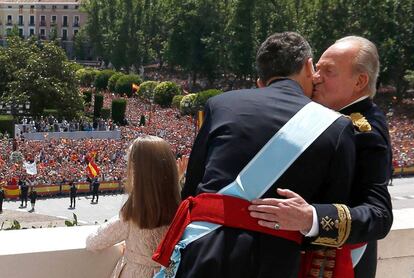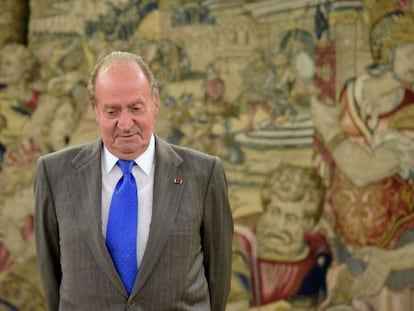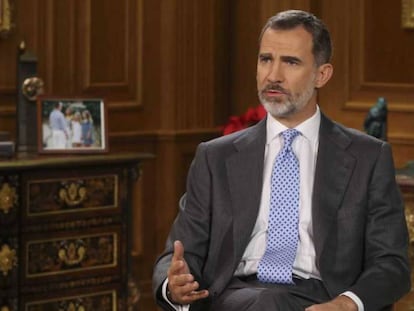The legacy of a king
Juan Carlos I¡¯s 80th birthday provides an opportunity to stress the importance of consensus

Eighty years ago, Spain¡¯s King Juan Carlos was born in exile in Rome: a date that will be complemented in the coming months by the 40th anniversary of the 1978 Constitution. Both celebrations should serve to vindicate one of the chief values promoted by the former monarch in our country: dialogue and democratic consensus. It was this form of action that made possible the transition from a dictatorship to a democracy in Spain, defining a successful political model that is unfortunately falling into disuse, provoking the return of the ¡°us-versus-them¡± dialectic that has done so much damage in our history.
A return to the spirit of the Transition would help to solve the major problems faced by Spain at this time
Alongside the public and private celebrations marking the 80th birthday of King Juan Carlos I, the anniversary should serve to highlight the most positive aspect of his legacy: that of the useful monarch who brought democracy to Spain in the form of a constitutional monarchy, who defended the country against a military coup when the latter looked set to succeed, who contributed in a notable way to raising the international profile of Spain, and who knew when it was time to step back, abdicating in favor of his son Felipe VI.
Spain¡¯s political parties, social and economic agents, its citizens and, of course, its institutional decision-makers at all levels should not forget the enormous transformation and modernization of Spain during the reign of Juan Carlos I. The mistakes made in the final years of his rule should not cast a shadow over the many successes of his actions as head of state during moments of enormous political, economic, and social difficulty in a Spain that sought reconciliation: as he said on the day of his coronation, ¡°our future will be based on effective consensus of national understanding.¡±
Juan Carlos I received all of the power from dictator Francisco Franco, and came to the throne in 1975 swearing allegiance to the Fundamental Laws of the (Francoist) Movement. However, he renounced his absolute power and set in train a democratic process with help from Torcuato Fern¨¢ndez Miranda and Adolfo Su¨¢rez, and thanks to the consensus forged between the main political forces ¨C some of them emerging from the underground ¨C from the Francoist far-right to the socialists and communists on the left. This led to the creation of accords based on dialogue and concession, all for the greater good: the creation of a fully democratic, prosperous Spain capable of joining the European Union.
Spain should not forget the enormous transformation and modernization of Spain during the reign of Juan Carlos I
The current crop of political leaders must not forget the values that allowed for national reconciliation and the transformation of Spain into a modern European state. A return to the spirit of the Transition, which was such a source of inspiration to King Juan Carlos, would help to solve the major problems faced by Spain at this time ¨C from the Catalan question to the reform of the Constitution and of other laws established 40 years ago.
Felipe VI, who came to the throne after his father decided to abdicate, has also inherited this desire for consensus, which he refers to in his speeches. Although his functions are extremely limited under the Spanish Constitution, it would be no bad thing if current political leaders shared this spirit of dialogue as was the case with their predecessors and with King Juan Carlos I.
English version by George Mills.
Tu suscripci¨®n se est¨¢ usando en otro dispositivo
?Quieres a?adir otro usuario a tu suscripci¨®n?
Si contin¨²as leyendo en este dispositivo, no se podr¨¢ leer en el otro.
FlechaTu suscripci¨®n se est¨¢ usando en otro dispositivo y solo puedes acceder a EL PA?S desde un dispositivo a la vez.
Si quieres compartir tu cuenta, cambia tu suscripci¨®n a la modalidad Premium, as¨ª podr¨¢s a?adir otro usuario. Cada uno acceder¨¢ con su propia cuenta de email, lo que os permitir¨¢ personalizar vuestra experiencia en EL PA?S.
?Tienes una suscripci¨®n de empresa? Accede aqu¨ª para contratar m¨¢s cuentas.
En el caso de no saber qui¨¦n est¨¢ usando tu cuenta, te recomendamos cambiar tu contrase?a aqu¨ª.
Si decides continuar compartiendo tu cuenta, este mensaje se mostrar¨¢ en tu dispositivo y en el de la otra persona que est¨¢ usando tu cuenta de forma indefinida, afectando a tu experiencia de lectura. Puedes consultar aqu¨ª los t¨¦rminos y condiciones de la suscripci¨®n digital.










































